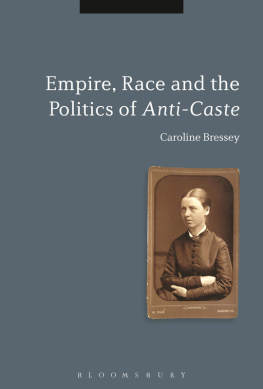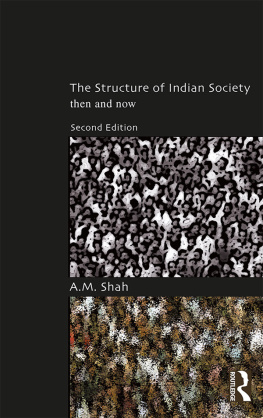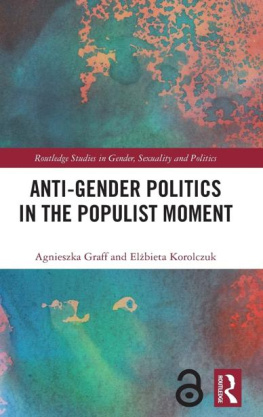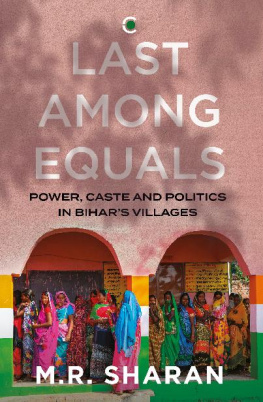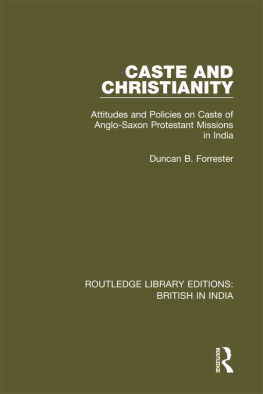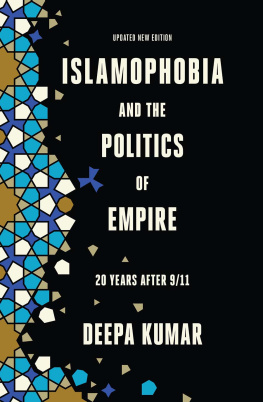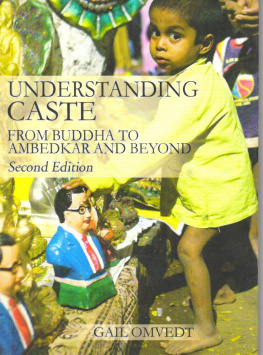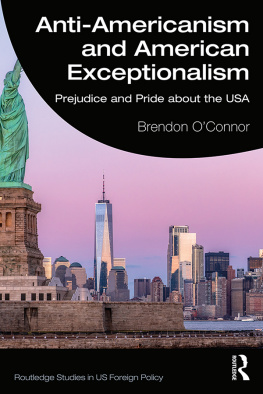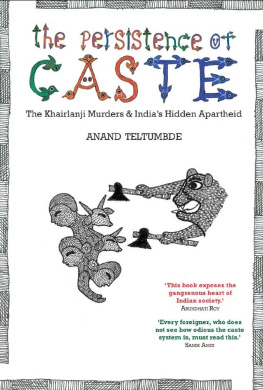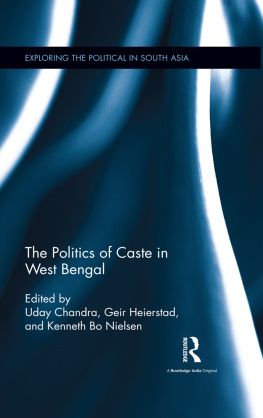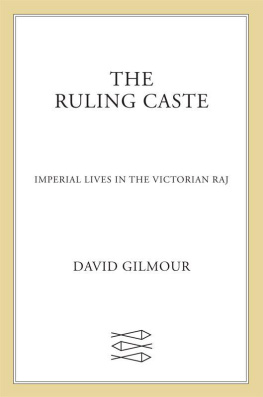Empire, Race and the Politics
of Anti-Caste
Empire, Race and the Politics
of Anti-Caste
Caroline Bressey
Bloomsbury Academic
An imprint of Bloomsbury Publishing Plc

Contents
Like the networks that were foundational to Anti-Caste , this book has been built upon networks of friendships, archives and archivists, libraries and librarians, seminars and the scholarly work of colleagues in the academy and in the community. I am pleased to be able to acknowledge my great thanks for the teaching and guidance of Linda McDowell, Philip Howell and Gerry Kearns, who first inspired my commitment to feminist, historical geographies and critical geographies. Philip Crang was instrumental in encouraging me to think about continuing my research at a postgraduate level and this book has its roots in my PhD thesis undertaken at the Department of Geography, UCL. My former supervisors Richard Dennis and Claire Dwyer remain an important source of encouragement and inspiration for my research. As a member of our departments cultural and historical research group and the broader geography community at UCL, I have benefitted greatly from the lively discussions with lecturers and students, including Tamsin Cooper, Jason Lim, Russell Hitchings, Peter Wood, Hugh Clout, Hugh Prince (an almost uninterrupted and active member of UCL Geography from 1946 until his death in 2013), Leandro Minuchin, Ben Lampert, Kezia Barker, Jo Norcup, Jennifer Robinson, Ben Page and Matthew Gandy. James Kneale is always generous with his advice, ideas and support and has provided me with valuable references and comments on earlier drafts and chapters. I have also been fortunate to work with Gemma Romain at the UCL Equiano Centre; her encouragement and enthusiasm for the breadth of our research projects has provided me with personal support and intellectual challenges. I also owe a great deal of thanks to Miles Irving in the Drawing Office at UCL, who spent many hours producing the maps and working on the illustrations, and to Nick Mann, who has always been on hand to help with numerous issues from computer failures to map searches.
Being based in London has enabled me to access the many thought-provoking seminars held at the Institute of Historical Research. I have particularly benefitted from the material presented and discussions held at the Reconfiguring the British seminars convened by Catherine Hall, Michael Collins, Keith McClelland, Clare Midgley, Zoe Laidlaw and Sonya Rose and those of the London Group of Historical Geographers, now convened by Miles Ogborn and Felix Driver. I have had valuable opportunities to present my work at seminars, and from participating in international and national conferences, in particular sessions organized by David Lambert, Steve Legg and David Featherstone and others supported by the RGS with IBGs Historical Geography Research Group and the Womens History Network. An early invitation from my old geography friend Alpa Shah to speak to her anthropology students encouraged me, with the help of her references, to think of Catherines activism and theorization of caste/race in a broader interdisciplinary context.
These and other events provided an opportunity to present ideas and in some instances formed the basis of papers published in the Journal of Historical Geography (Reporting Oppression: Mapping Racial Prejudice in Anti-Caste and Fraternity 18881895 , 38, 2012: 401411, http://dx.doi.org/10.1016/j.jhg.2012.04.001 and Women: a Cultural Review (Victorian Anti-racism and Feminism, 21/3, 2010: 279291, www.tandfonline.com/doi/full/10.1080/09574042.2010.513491), from which material in this book has been drawn. My thanks are extended to the editors of these journals and the anonymous reviewers whose comments helped sharpen my thinking, as did the questions and notes of fellow students on two valuable courses on non-fiction writing organized by City Lit adult education college, London. In developing the proposal and manuscript, I am greatly obliged to Clare Midgley, Vron Ware and Antoinette Burton for their careful readings and thoughtful suggestions. At Bloomsbury I would like to thank Frances Arnold, for seeing the potential of the project and commissioning my proposal, and Emily Drewe, who has seen it through to its completion.
Direct funding from the ESRC (RES-22-0522) supported a number of visits to the Schomburg Center for Research of Black Culture at the New York Public Library that proved invaluable. The Schomburg Centers commitment to collecting and caring for material of interest to the African diaspora means that archival papers no longer available in Britain can still be accessed by researchers, even when, such as in the case of United States Atrocities , they were published in London. In 2009 the award of a Leverhulme Prize enabled me to visit archives that I would not have otherwise been able to access, including Yale University Library and the National Library of Australia, Canberra. During my stay in Melbourne and association with the Monash Indigenous Centre, Jane Carey introduced me to a network of researchers that are examining complex issues of black history, antiracism, feminism and the fragility of archives, as did Fiona Paisley during my too-brief visit to Brisbane. Listening to their discussions, absorbing the richness of their empirical work and reflecting on their questions was important to my own rethinking of the gaze of my own writing. During my stay in Australia I also found the time to rewrite a large part of the manuscript. My old friend Toby Ansell, his wife Louise and their son Angus were on hand to help me with whatever I needed, including last-minute repacking of overweight bags filled with books and manuscript notes.
For over a decade I have benefitted enormously from the energetic and pioneering network of community scholars, activists and teachers I have been introduced to through BASA, including Hakim Adi, Jonah Albert, Kathy Chater, Sean Creighton, Jeff Green, Daniel Grey, David Killingray, Dan Lyndon, Fabian Thompsett, Martin Spafford and Marika Sherwood, who early on in this project generously passed on material she had gathered on Catherine. The many BASA conferences, the Newsletter and seminars have provided spaces for me to discuss my work with a variety of specialist audiences in addition to placing this project in the context of my broader research activities on the black presence in London, and I extend my thanks to Sandy Nairne, Jan Marsh, Bernardine Evaristo, Makeda Coaston and Tom Wareham for their enthusiasm and support for my endeavours.
At a time when archives and libraries in Britain are under great financial pressure, I have still been able to benefit from the enormous commitment, specialized knowledge, professionalism and enthusiasm for collections that numerous archivists and librarians have shared with me. I am particularly grateful to Lucy McCann at the Bodleian Library at the University of Oxford, who answered many queries, and Tim Crumplin ), courtesy of the National Library of South Africa: Cape Town campus.
During the weeks I spent at the National Library at Cape Town, Inca Waddell and her parents, Kathy and Gordon, were wonderful hosts as usual. I am deeply saddened that Gordon is not here to see the completion of the book. I am also very sorry Jill Black is not here to see the manuscript to completion as she always greatly encouraged my research, as have our fellow Nenwnhamites Bethan Cobley, Fflur Jones, Charlotte Ross, Catarina Tully and Inca along with Tim Prosser, Justine Waddell and my old friends Sarah Loch, Sam Rich, Chris Watts and Martyn, Lynn and Sally Milner. Their support has come not only in the form of encouragement and a willingness to listen to woes about unfulfilling archive trips and dishearteningly slow progress but also in the form of their patience when visits out of London and the solitude of writing meant I was not around to hear their stories of everyday life. For always supporting me in my studies I am grateful to my family Stephen, Jeanie and Sylvia Bressey and my grandmother Eleanor Bressey, who is sadly not here to read this; I think she and my great aunt A L Wright would have greatly admired Catherines tenacity and independence.
Next page
